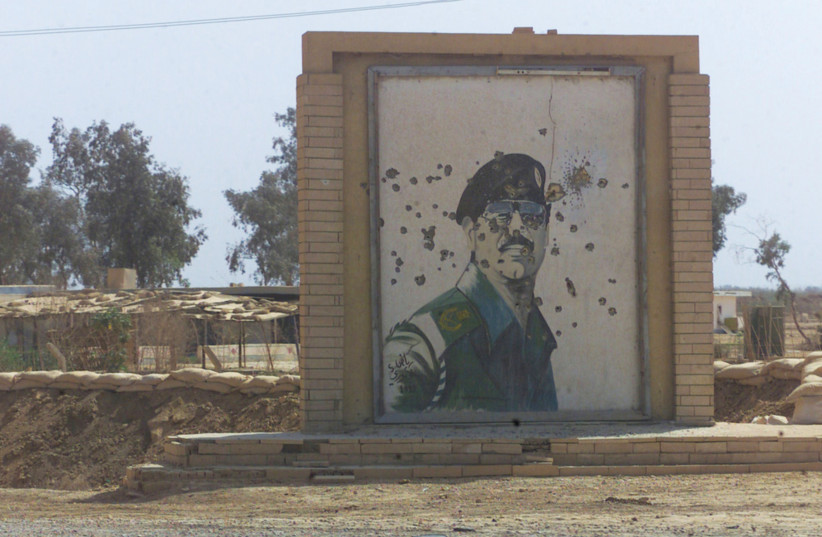Toward the end of 2002, with the United Nations scheduled to vote on a resolution authorizing a US-led attack on Iraq, president George W. Bush asked the CIA to assemble evidence that Saddam Hussein had ties to terrorism and possessed weapons of mass destruction (WMDs). Following a high-level presentation, Bush asked, “Is this the best we’ve got?” When CIA director George Tenet maintained that the case for weapons of mass destruction was “a slam dunk,” the president did not challenge him.
“If Saddam doesn’t actually have WMDs,” he asked himself, “why on earth would he subject himself to a war he will almost certainly lose?”
In February 2003, Hans Blix, head of the United Nations Monitoring, Verification, and Inspections Commission searching Iraq for WMDs, was beginning to suspect that the absence of evidence was evidence of absence.
“It would be paradoxical,” he told British prime minister Tony Blair, “to go to war for something that might turn out to be very little.”
Meanwhile, Hussein, who was skeptical that the US would launch a full-scale invasion, told his generals that airstrikes would last only a few days. He remained convinced that he could remain in power, as he had following the First Gulf War in 1991 and his expulsion of international weapons inspectors in 1998.

In his book The Achilles Trap, Steve Coll (a staff writer for The New Yorker, former dean of Columbia University’s Graduate School of Journalism, and author, among other books, of The Bin Ladens, Directorate S and the Pulitzer Prize-winning Ghost Wars) draws on a mountain of documents, interviews, and Saddam Hussein’s transcripts and audio tapes, to examine the decades-long history of misunderstandings and missteps on both sides that led to a war that killed some 200,000 Iraqi civilians and thousands of American service personnel and contractors.
The Achilles Trap is likely to be the best account of these developments we will ever have.
The best account of what led to the Iraq War
Saddam, Coll reveals, possessed “immense energy, self-confidence, restless suspicion, and unpredictability.” An avid reader, patron of the arts, and author of several novels, capable of “cunning insights” and “dumbfounding blindness,” Hussein “adored one heroic story above all others: his own.”
He was saddled with a large family, whose ambitious and brutal members – his son, Uday; his son-in-law, Hussein Kamel; and Ali Hassan al-Majid (“Chemical Ali”) – abused their privileges. To protect himself from traitors and assassins, Saddam virtually never used a telephone; rarely worked at the Republican Palace or slept in the same place for more than a day or two; ordered lab tests of his birthday cakes; packed a Browning 9-millimeter pistol; was accompanied by bodyguards to meetings; and had listening devices installed in the homes and offices of tens of thousands of Iraqi citizens.
Saddam blamed “the lack of stability” in the Middle East on the “evil alliance” between the United States and Israel, “the evil Zionist entity,” to “exploit the world and plunge it in blood and darkness.”
During the First Gulf War, he threatened to use chemical weapons to “eat half of Israel.” To gain support from its Arab neighbors, Iraq fired Scud missiles into Israel.
“We attacked Tel Aviv,” Saddam declared, “because it is America’s and Britain’s daughter, and whatever hurts Tel Aviv will hurt them, too.” He subsequently mocked president Bill Clinton for wearing a yarmulke at the funeral of Yitzhak Rabin: “Is Clinton waiting to be paid money by the Zionists so he can balance his budget?”
SADDAM MAY well have been paranoid, Coll suggests, but he wasn’t entirely wrong about the double game the United States and Israel had played in the region. Both countries, for example, secretly sent arms to Iran during the Iran-Iraq war in the 1980s.
Most importantly, Coll emphasizes that “confirmation bias” caused Saddam to misread the claims about WMDs embraced by the Clinton and George W. Bush administrations. Saddam was certain that the CIA knew that he had ended Iraq’s chemical, biological, and nuclear weapons programs (and ordered evidence about them to be secretly destroyed to keep his enemies inside and outside Iraq guessing).
Since American and Israeli policymakers knew the truth, he concluded that in the aftermath of the September 11, 2001, terrorist attack on the World Trade Center, they were using the issue to justify overthrowing him.
And, Coll writes, Saddam “saw no reason to play their game.” That he had remained in power for so long after the Second Gulf War apparently convinced him that bluster, evasion, and lies would continue to work. And to “ignore his vulnerability to false accusations about his own responsibility for the attacks.”
The United States invaded Iraq in March 2003. On May 1, president Bush appeared on an aircraft carrier to declare “Mission accomplished,” the establishment of an occupation government in Baghdad, and the dissolution of the Ba’ath Party.
On December 13, US Special Forces captured Saddam, who was hiding in a hole under a mat on a farm owned by some of his bodyguards. Tried and convicted, Saddam was hanged on December 30, 2006.
The war, Coll acknowledges, removed a brutal dictator and was hailed by Iraq’s previously suppressed Shi’ite majority and the country’s Kurds. But the conflict also fractured Iraqi society, wrecked its economy, emboldened Iran, contributed to the temporary rise of the Islamic State, and destabilized the region.
From the perspective of American interests and security, 20 years after the mission was allegedly accomplished, Coll concludes, president Bush’s decision to authorize a preemptive war of choice “still looks like a catastrophe.”■
Glenn C. Altschuler is The Thomas and Dorothy Litwin Emeritus Professor of American Studies at Cornell University.
- THE ACHILLES TRAP: Saddam Hussein, the CIA, and the Origins of America’s Invasion of Iraq
- By Steve Coll
- Penguin Press
- 576 pages; $35
